| Spotlight
State of Science Education in Bangladesh
Current Status and Future Trends
Shamim Ashraf
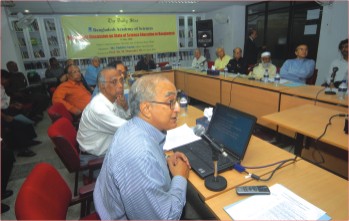
Science, what once used to be the most sought after subject at secondary, college and university levels in the country, is losing its appeal in an alarming shift of choice. This was observed by eminent scientists and educationists at a roundtable session titled State of Science Education in Bangladesh, jointly organised by The Daily Star and Bangladesh Academy of Sciences (BAS), which was held in The Daily Star conference room on the 12th of July. Participants from different institutions were invited to share their views on the current status and future trends of Science Education in Bangladesh.
While enrolment for science studies shows a sharp decline over the past few years, quality of science education also took a slide during the same time with an evident dearth of quality teachers. But even in colonial days, Bengalis like Jagdish Chandra Bose, Satyen Bose and Meghnad Saha proved commendable science skills. Of the 10 scientists whose pictures are being exhibited in the National Oceanographic Institute at Goa, India, four are from Bengal. Today, the contribution to the world repository of science and technology of this seventh most populous country is painfully meagre.
What contributes most to the decline of the quality of science education and student enrolment? What are the ways to bring back the days of glory? How to popularise science education to create an army of scientists who would work devotedly to find solutions to the environmental and economic challenges facing the country? These were the questions the country's key scientists and educationists tried to find answers of when they gathered at The Daily Star office on July 12.
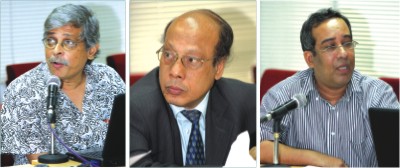
With BAS President Prof M Shamsher Ali in the chair, the event saw presentation of four keynote papers on related topics. The experts were unanimous in saying that the country has no alternative to using science education as a tool for improving the living standards of the people and for dealing with the economic and environmental challenges it faces. Alarmed at the decline of the quality of science education and student enrolment, key scientists and educationists of the country stressed the need for sensitising the government to allocating a larger budget for the sector to enhance teachers' capacities and updating the curricula.
Weak curriculum and textbooks, weak teaching and assessment methods, lack of properly trained teachers and laboratory facilities, poor salaries of the teachers, and students' sliding interest were pointed out to be some of the main reasons for qualitative and quantitative decline of science education.
Besides simplification of science textbooks, raising teachers' salaries and motivating science graduates to become teachers, introduction of a terrestrial television channel dedicated to broadcasting educational programmes would help both teachers and students by reducing the latter's dependence on private coaching centres and thus save a huge cost.
They underscored the need for recruiting quality teachers and building capacities of the existing ones through tele-education using ICT based materials, for resuming the government's stalled PhD programmes, and for organising science weeks and science fairs.
When asked if rapid expansion of job opportunities for commerce subjects the key reason for keeping students away from science studies, Dr Zafar Iqbal replied in the negative.
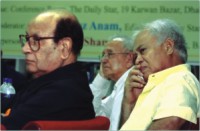 "It's true that there is a global trend towards commerce education but there are many other reasons that are discouraging students from taking science," he continued. “If you take a secondary-level science textbook, you'll find the pages are multicoloured,” he said displaying a photograph of two pages, one greenish while the other light pink. The prints on the other side of the page can be seen through and the drawings and bindings are of poor quality. He displayed the book while presenting his paper on 'Quality of teachers and facilities available for science education at the secondary and higher secondary levels'. "It's true that there is a global trend towards commerce education but there are many other reasons that are discouraging students from taking science," he continued. “If you take a secondary-level science textbook, you'll find the pages are multicoloured,” he said displaying a photograph of two pages, one greenish while the other light pink. The prints on the other side of the page can be seen through and the drawings and bindings are of poor quality. He displayed the book while presenting his paper on 'Quality of teachers and facilities available for science education at the secondary and higher secondary levels'.
“In secondary level, science text books are really terrible, a student cannot understand the materials on his own,” Dr. Zafar Iqbal said.
Dr Zafar Iqbal had visited a number of schools and colleges in Sylhet town to get a first hand account of the students and teachers.
“Teachers cannot and in many cases do not teach properly in classrooms and one needs private coaching to study science, which is expensive and affordable only to the affluent,” he noted. After all these troubles, only a small fraction of students get the chance to study medicine and engineering or even to study at universities.
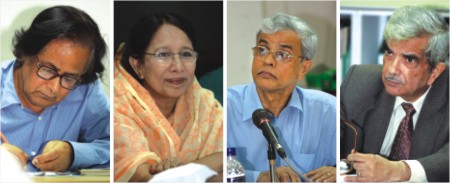
“Commerce, on the other hand, is a lot easier to study and to get good marks in. One can get into a BBA programme which has a lot of job opportunities,” he said, adding that about 10 percent of the good students switch to commerce.
While dwelling on practical syllabus, he said that a general belief is that the practical syllabus is too short and can be completed in 5-7 classes is not true.
"In most schools, practical classes start from class X, sometimes after the test examination, depriving students of practical classes in class IX. Eighty percent students get 90-100 percent grade without any effort and get pass marks for just attending the exam," he said. Eighty percent of the rural schools have no laboratory facilities while those who have it have too many students in a practical lab.
The intermediate level science curriculum is not consistent with secondary level, he pointed out, adding that many students and teachers think the materials are of BSc Honours level. The intermediate session is too short and students only get one and a half years to complete the two-year session. “Of this one and a half years, there are very few working days as classes remain suspended due to various exams taking place in their classrooms,” he added. He proposed central examination hall for colleges. Pointing out the drastic reduction in enrolment in Bachelors (Pass) Level, which dropped by almost 90 percent, he said teachers get into trouble if they do not get enough students in a batch. Besides problems in teachers' recruitment, salary of part time teachers is very poor with a teacher getting approximately Tk 1,500 only a month, he said. According to Zafar Iqbal, "While schools used to have 1.5 teachers per section, now they have one teacher per section," adding that a section that had 40 students before 1995 now has 60 students.
He points out that, “Due to enrolment reduction in BSc (Pass) level, there is a severe scarcity of science teachers.”
He stressed the need of planning of human resources for the next 5 to 10 years.
“While we need a huge number of CSE (Computer Science and Electronics) graduates, very few are studying in this field these days,” he noted. Pointing out the lack of motivation to become a teacher, he said that teaching is not a respectable profession anymore.
The textbooks fail to fire a spirit of inquiry, said Prof Shamsher Ali while presenting his keynote paper on 'Government policy on science education and what the government should do'.
Proposing formation of a commission for recruiting teachers, he mentions, "To attract science graduates to the teaching profession, we need to formulate a policy that will ensure jobs for them with handsome salaries."
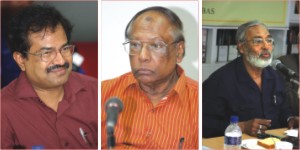 While presenting a keynote paper on 'Science education at secondary and HSC levels', Jamilur Reza Choudhury, the Vice-Chancellor of BRAC University, pointed out that the national budget allocation for education in 2004 was only 2.3 percent of the GDP while UNESCO recommends an allocation of a minimum of 5 percent. He suggested scholarships for young faculty members for higher studies and research, and making science compulsory at the secondary level. Saying that science should be made compulsory in secondary level, he identified textbooks with good quality drawings, photographs, printing and paper, properly equipped laboratories, and use of ICTs and internet as prerequisite to raise the quality of science education. While presenting a keynote paper on 'Science education at secondary and HSC levels', Jamilur Reza Choudhury, the Vice-Chancellor of BRAC University, pointed out that the national budget allocation for education in 2004 was only 2.3 percent of the GDP while UNESCO recommends an allocation of a minimum of 5 percent. He suggested scholarships for young faculty members for higher studies and research, and making science compulsory at the secondary level. Saying that science should be made compulsory in secondary level, he identified textbooks with good quality drawings, photographs, printing and paper, properly equipped laboratories, and use of ICTs and internet as prerequisite to raise the quality of science education.
Stressing the training of teachers, he proposed financial incentives for teachers and students besides competitions and festivals for physics, chemistry, biology like the Math Olympiad and recognition of the top performers. As remedial actions, Prof Chowdhury suggested amending the Universities Act, banning teachers and students' active involvement in politics in front organisations of political parties, asking students to bear a share of the cost (introduction of loan scheme for needy meritorious students) and access to digital libraries thus creating a national network for education and research organisations.
Prof Mohammad Kaykobad of the Department of Computer Science and Engineering of BUET presented an alarming data that shows the decline in enrolment to science groups.
A total of 264,000 students appeared in the SSC examinations from the science group in 2001, but the number dropped to 200,000 in 2006, although the total number of SSC candidates increased, Prof Mohammad Kaykobad of the Department of Computer Science and Engineering at BUET said while presenting his keynote paper titled 'Status of science education in Bangladesh'.
"Korean and Malaysian students used to have education in this country some 40 years back," he said, pointing out that the direction has now reversed, a clear evidence of our lack lustre performance in education. "Korea and Malaysia are now great examples of countries that are advancing with great speed by investing in education, science and technology."
“For our survival in the 21st century competitive world, we must follow their footprint and invest heavily in human resources giving priority to science and technology.”
Being the seventh most populated country in the world and having the highest density apart from the city-states, the only hope for survival is investment in science and technology, he said.
Talking about the reasons, he said, “Our industries, including ICT, could not perform anywhere near the expectation of common mass as has happened in the neighbouring country India. This must have demoralised the nation and has resulted in the setback of science enrolment.”
In the backdrop of closing down of top industries of the country, a negative feedback has been given to the nation that we are looking for our future not in the production sector, he said.
Members of school and college management committees, especially of those in the rural areas, are not usually qualified enough to contribute for the betterment of education. Mohammad Kaykobad continued,
“In the name of globalisation, multinational industries are penetrating into the country with their products for which we are acting as agents or salesperson only. This has possibly increased the interest of studying business-oriented courses. Even the best students of the country with good skill in physics, chemistry and mathematics are opting for business oriented courses that probably will never challenge their analytical skill.”
NGO's, UN and other international organisations, working in the country with the agenda of developing various aspects of the country, are looking for graduates in fields other than science and engineering, he added.
Talking on science textbooks, he said those are not written with the aim for creating inquisitiveness in children, nor for their enjoyment.
“For example, biology part of science books of classes VI and VII have been stuffed with so much Latin words that the meaning of the statements requires a good amount of effort for their appreciation, and science remains Greek and Latin to the young kids. This does not in any way develop in kids a thirst for scientific knowledge,” he said.
Poor laboratory facilities might have also deprived the students from enjoying the beauty of science, Kaykobad noted.
The experts noted that globalization and the role played by multinational companies in the changed scenario are contributing a lot to the introduction of more business-oriented courses and the shift to commerce studies from sciences.
The commerce and business graduates get salaries much higher than that of the science teachers, they said.
The scientists and educationists stressed that science curricula must be need based and students should be encouraged to scientific ways of thinking. Stressing the need for bringing back science education to the mainstream, Mahfuz Anam, editor and publisher of The Daily Star, suggested organising a national science convention, and similar events at district levels.
He commented, “The future economy will be science based.”
Expressing concern at the impact of climate change on Bangladesh, he underscored the need for finding scientific ways to tackle the problem. The experts stressed the need for coordinating the SCC and HSC science curricula, so students are prepared enough to tackle higher level of science when they enter colleges after graduating from high schools. A better coordinated science curriculum at every level of the education system is a must, they said.
"There is no calculus in HSC first year mathematics courses, although science students need to study calculus to understand physics courses," said Sushanto Kumar Sarker, an associate professor of physics at Notre Dame College.
"Maths should be made compulsory for science students," Dr Mohammad Ali Asgar of the physics department at East-West University said. The science policy has been gathering dust for six years, National Professor MR Khan pointed out.
The experts strongly said 'no' to guidebooks saying those gradually destroy the inquisitiveness and limit the horizon of the students' mind.
The teachers have to be motivated to teach the students only in the class. “They have to teach in a way that the students no more need to go to any private tuitions or coaching centres,” Prof Zafar Iqbal said.
Prof Jamal Nazrul Islam of Chittagong University, BAS Secretary Naiyyum Choudhury, former VC of National University Aminul Islam, Shamima Karim Chowdhury of DU, and Mesbahuddin Ahmad, dean of post graduate studies at Gono Bishwabiddalay also spoke in the occasion.
It is now time that the government takes the necessary actions as proposed by the eminent speakers in the roundtable discussion to improve the state of science of science education in Bangladesh and thus ensure prosperity and progress in the near future.
(Shamim Ashraf is a correspondent of The Daily Star)
Copyright
(R) thedailystar.net 2008 |

